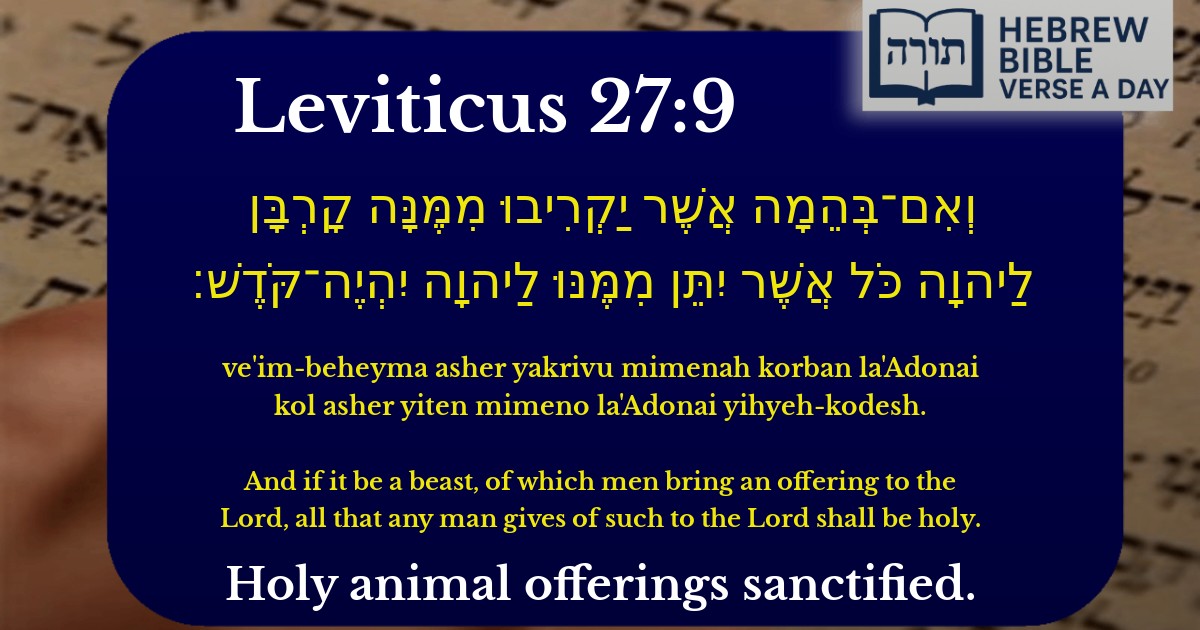Join Our Newsletter To Be Informed When New Videos Are Posted
Join the thousands of fellow Studends who rely on our videos to learn how to read the bible in Hebrew for free!
Hebrew Text
וְאִם־בְּהֵמָה אֲשֶׁר יַקְרִיבוּ מִמֶּנָּה קָרְבָּן לַיהוָה כֹּל אֲשֶׁר יִתֵּן מִמֶּנּוּ לַיהוָה יִהְיֶה־קֹּדֶשׁ׃
English Translation
And if it be a beast, of which men bring an offering to the Lord, all that any man gives of such to the Lord shall be holy.
Transliteration
Ve'im-beheyma asher yakrivu mimenah korban la'Adonai kol asher yiten mimeno la'Adonai yihyeh-kodesh.
Hebrew Leining Text
וְאִ֨ם־בְּהֵמָ֔ה אֲשֶׁ֨ר יַקְרִ֧יבוּ מִמֶּ֛נָּה קׇרְבָּ֖ן לַֽיהֹוָ֑ה כֹּל֩ אֲשֶׁ֨ר יִתֵּ֥ן מִמֶּ֛נּוּ לַיהֹוָ֖ה יִֽהְיֶה־קֹּֽדֶשׁ׃
וְאִ֨ם־בְּהֵמָ֔ה אֲשֶׁ֨ר יַקְרִ֧יבוּ מִמֶּ֛נָּה קׇרְבָּ֖ן לַֽיהֹוָ֑ה כֹּל֩ אֲשֶׁ֨ר יִתֵּ֥ן מִמֶּ֛נּוּ לַיהֹוָ֖ה יִֽהְיֶה־קֹּֽדֶשׁ׃
🎵 Listen to leining
Parasha Commentary
📚 Talmud Citations
This verse is not quoted in the Talmud.


Overview of the Verse
The verse (Vayikra 27:9) discusses the sanctity of animals brought as offerings to Hashem. It emphasizes that once an animal is designated as a korban (offering), it attains a holy status and must be treated with the proper reverence due to sacred objects.
Rashi's Commentary
Rashi explains that this verse refers to animals consecrated for sacrifices, particularly those that are kodshei mizbeach (sanctified for the altar). Once an animal is declared as a korban, it cannot be redeemed or used for mundane purposes. Rashi cites the Talmud (Temurah 5a) to clarify that this sanctity applies even if the animal develops a disqualifying blemish—it remains holy and cannot be exchanged or sold.
Rambam's Perspective
In Hilchos Me'ilah (8:8), the Rambam elaborates that any animal designated as a korban becomes the property of the Beit HaMikdash (Temple) and is subject to the laws of me'ilah (misusing sacred property). Even if the animal is no longer fit for sacrifice, its holiness remains intact, and it must be dealt with according to halachic guidelines—either left to graze until it develops a permanent blemish or redeemed in a prescribed manner.
Midrashic Insight
The Midrash (Torat Kohanim) connects this verse to the broader theme of kedushah (holiness) in avodah (Temple service). It teaches that once an object or animal is dedicated to Hashem, it undergoes a spiritual transformation, elevating it beyond ordinary use. This principle applies not only to sacrifices but also to other forms of consecration, such as hekdesh (property dedicated to the Temple).
Practical Halachic Implications
Conceptual Lesson
The verse underscores the irrevocable nature of dedication to Hashem. Just as a korban cannot revert to mundane status, our commitments to mitzvos and spiritual growth should be unwavering. The Sages (Chullin 84a) derive from here that one must fulfill vows promptly, reflecting the seriousness of dedicating something to divine service.